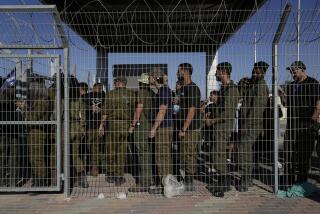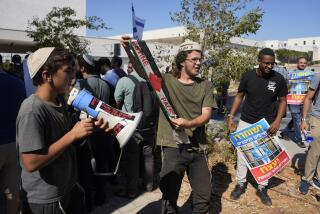Witnesses Tell of Troop Stress Before Attack
- Share via
BAGHDAD — U.S. soldiers accused of raping a 14-year-old Iraqi girl and killing her along with her family suffered from tremendous stress and were ultimately not responsible for the alleged massacre, defense attorneys said Tuesday, as final arguments began in a hearing to determine whether the men should face a court-martial.
But a prosecutor attacked the contention, saying the adverse conditions of war couldn’t explain away crimes.
“Murder, not war. Rape, not war -- that’s what we’re here talking about today,” Capt. Alex Pickands said in final arguments. “Not all that business about cold food, checkpoints, personnel assignments. Cold food didn’t kill that family. Personnel assignments didn’t rape and murder that 14-year-old little girl.”
Pickands’ comments followed testimony describing sleepless nights and despair among soldiers assigned to patrol one of the most lawless areas in Iraq.
The teenager and her 5-year-old sister and parents were found slain in their house in Mahmoudiya, a southern Baghdad suburb, on March 12, in an incident that has enraged Iraqis and shamed the U.S. military.
“These soldiers are not robots,” said defense attorney Capt. Elizabeth Walker. “They are humans with emotions, and the command structure hung them out to dry.”
Earlier, echoing testimony from previous days, soldiers serving alongside the accused troops testified that fear and relentless violence had driven the soldiers to mix painkillers, cough syrup and Iraqi whiskey.
Final defense arguments are expected to continue today, after which the tribunal’s investigating officer will determine whether the five men will face a court-martial.
Spc. James P. Barker, 23, Sgt. Paul E. Cortez, 23, Pfc. Bryan L. Howard, 19, and Pfc. Jesse Spielman, 21, are charged with rape and murder and could face the death penalty. A fifth soldier, Sgt. Anthony W. Yribe, is charged with dereliction of duty and making a false statement.
Steven D. Green, 21, a former private discharged from the military earlier in the year because of a “personality disorder,” according to court documents, faces a separate trial in federal court.
Soldiers testified Tuesday that they sometimes spent several weeks without hot food, showers or contact with home when in Mahmoudiya. Constant foot patrols in search of roadside bombs, a fire that destroyed all their belongings and the shooting of two U.S. soldiers contributed to a unit “full of despair,” one soldier testified.
“You feel like every step you might get blown up,” said Pfc. Justin Cross, who served in the same unit as the accused. “You just hit a point where you’re like, ‘If I die today, I die.’ You’re just walking a death walk.”
Soldiers drank Iraqi cough syrup, which “makes you feel high,” took painkillers and drank whiskey to relieve stress, Cross testified. “Everybody was very depressed,” he said.
Soldiers also testified that Green set a puppy on fire and threw it off the roof of a building. Other accused soldiers have pointed to Green as the triggerman in the quadruple homicide.
David Sheldon, the civil lawyer for Barker, accused Green of being the sole culprit in the deaths.
“When you put an individual like that in a stressful situation, he becomes a canister of gas, waiting to explode,” Sheldon said. “Green -- he’s the one who should be facing capital murder. These soldiers here don’t deserve that. Not one of them.”
In closing arguments, defense lawyer Capt. Megan Shaw asked about the accused: “Where is the evidence regarding the meeting of the minds?”
But prosecutors said that all the soldiers were culpable.
They are “not kids who spilled milk on the floor because their parents aren’t watching,” said Capt. William Fischbach. “They knew what they were going to do. When they heard the shots, they kept raping the girl.”
As soldiers testified at a U.S. base near the Baghdad airport, security forces sought to clamp down on violence that claimed the lives of two dozen Iraqis in the capital, and two others elsewhere in Iraq, on Tuesday.
This morning, the military announced that two crew members were missing after a Black Hawk helicopter from the 3rd Marine Aircraft Wing crashed in Al Anbar province with six coalition troops on board.
It said the other four were in stable condition, and the crash did not appear to be the result of enemy fire.
Authorities on Tuesday also confirmed earlier slayings of two journalists.
About 6,000 Iraqi security forces and 5,500 American soldiers are being redeployed to Baghdad as part of an effort to stem rising violence there.
During the morning hours, robbers targeting Al Rasheed Bank in northern Baghdad gunned down three guards and two bank employees, escaping with about $4,000.
Later in the day, four bombs killed 19 people in various neighborhoods.
Ismaeel Ameen, a freelance journalist, was found dead behind a sports club near his home in eastern Baghdad, Iraqi officials said. The 30-year-old was kidnapped two weeks ago, and his body bore torture marks.
Mohammed Abbas, 23, a journalist working for a local newspaper, was ambushed and killed by gunmen on his way home Monday in western Baghdad, police said.
Times staff writers Saif Hameed and Shamil Aziz contributed to this report.
More to Read
Sign up for Essential California
The most important California stories and recommendations in your inbox every morning.
You may occasionally receive promotional content from the Los Angeles Times.













